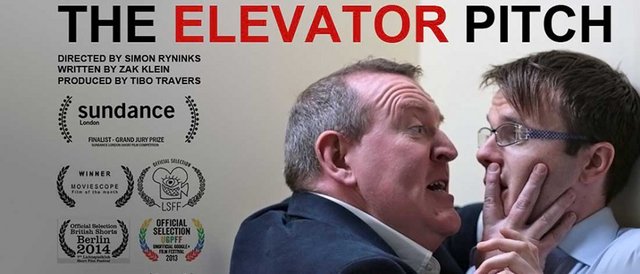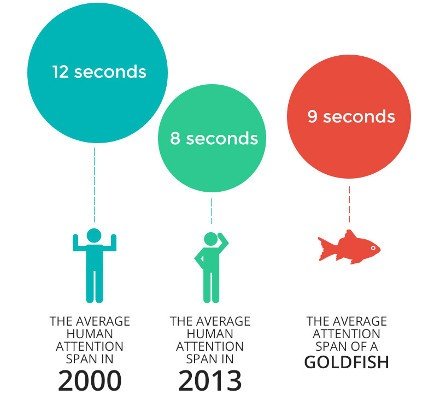 Source: The Elevator Pitch (Sundance)
Source: The Elevator Pitch (Sundance)
Those words terrify entrepreneurs. You get one chance to make a first impression.
And fear of failure often ruins that. Overconfidence is equally harmful though.
And one way or another, most startups screw this up. It isn’t easy. It isn’t hard either though.
Short, sweet and to the point. That is what you should be aiming for.
“I help startups grow, scale and find funding.”
… that is okay. It gets the point across. But it isn’t quite specific enough. You need to do better.
Who is your target customer?
Identify them. There are NO mass market products or problems. Trying to please everyone pleases no one.
You NEED an initial base of target customers or you won’t succeed.
For me, I advise and invest in early stage tech startups… But every company is kind of a startup. Heck, Gmail was in beta mode for years.
So when does a startup stop being a startup and start being a company? Is Airbnb a startup? Google? Uber…
You need to be specific. You need to be something for someone or you are just nothing for everyone.
Find your niche and fill it. Become a badass in that space, then and only then can your company think of expanding to serve a larger market.
How you help is important too
Con artists overpromise. Entrepreneurs do the same. In essence we are all salesmen.
But to sell, you can’t smell like bullshit. Bold claims better be backed up by something cause these days investors won’t fall for anything.
An idea and fancy pitch deck won’t get you funded. This isn’t the 90s. A catchy idea needs a clear business model and strong team to back it up.

How do I help startups? How do you help your customers?
That is the question every startup MUST answer in their pitch. The devil is really in the details. You could take 10 minutes to explain your company, or you could take 10 seconds.
Attention spans being what they are, you need to hammer home fast. You have 10 seconds to grab my attention, 30 seconds to wow me… What is your plan?
Source: MindfulMooves
Elevator Pitch Examples:
Slack — We help businesses and organizations communicate with a simple chat interface.
Uber — We help individuals get from A to Z with a simple ride sharing app.
Amazon — We help people buy and sell things online.
Facebook — We help individuals stay connected and share experiences online.
It can be that simple. We help X achieve Y.
That is the formula to start any pitch. It grabs your attention and instantly explains your business. It isn’t overly detailed but it covers the basics, who and how.
Your pitch should change depending on your audience.
What about Why?
Why you are building this business is often key. Why determines whether investors and employees get on board.
And fyi, to make a lot of money isn’t a good reason. It does not drive emotions, only dollars. And WHY is what drives you.
Passionate entrepreneurs solving personal or large scale problems are more driven and motivated to win. They deal with the highs and lows of entrepreneurship and keep fighting. Folks looking for the quick cash don’t.
As an investor/advisor, I avoid the latter. The money matters. It matters a lot. But without a bigger driver your business will almost surely stall. And burnout can be a big problem.
[LIKE THIS ARTICLE SO FAR? THEN YOU’LL REALLY WANT TO SIGN UP FOR MY NEWSLETTER OVER HERE — AND GET SOME FREE BONUSES!]
Your company should be a mission.
What is your vision of the world? What are you working to create?
This captivates people. It pulls them into your brand. And investors look for that fire.
For me it is freedom. Corporations and governments have failed. A desk job would kill me.
And I believe entrepreneurs change the world. Not countries. Not corporations. Those dinosaurs care only for self preservation, everyone else be damned. Innovation isn’t exactly their forte.
I work with founders looking to change the world and make a ton of money in the process. Startups are exponential. Helping a founder creates a company, a mission, employs people, creates wealth and distributes prosperity in ways nothing else can.
That is my mission. That is what drives me as an investor, advisor and writer.
What drives you?
Okay, okay. But what about the money?
Small opportunities aren’t exciting. Money is the ultimate drug. Use it aggressively. But also be careful.
Unrealistic market sizes and comparables can cripple your pitch. You NEED to be on point here. Be specific. Explain your reasoning.
Here is what I mean.
Frequently founders pitch a market. The professionally managed global real estate market is about $7 trillion dollars. The total real estate market estimates top $217 trillion however.
That is a big difference.
If you are building an app to help professional real estate companies manage their portfolios, your maximum possible TAM is about $7 trillion (technically much lower unless you look to own the real estate assets themselves).
But $217 trillion sounds a lot sexier though.
Don’t do it. Investors will call you on it. They can see you are full of crap. Either you are lying or too dumb to understand the market potential. Either way you are uninvestable.
“Let me cut you off there. Thanks for your time. We will follow up via email if we are interested..”
Game over. A small slip and your pitch is kaputt.
Why now?
Investors are sharks. They are looking for opportunities and unfair advantages.
What makes your startup different? Why will you succeed where others failed? Why is now the perfect time?
These are the critical questions that your pitch must answer.
It is a bit much for 30 seconds. That is okay though. If someone is interested enough, they will keep listening.
So why now? Why is this a now or never opportunity?

Scarcity sells. This is a limited time offer. People are afraid of missing out.
You are a salesman so sell.
Are markets changing? Has a new technology opened up an industry? Is change in legislation creating an opportunity?
It is now or never. It has to be…. So do not miss out on the next Uber, Facebook, Google, etc…
Pitch Perfect
See what I did there…
Do not do that in your pitch. Being cutesy and dropping buzzwords is a surefire sign you are out of your league.
So, bringing it all together. What are the keys to a successful elevator pitch?
- Who?
- Why?
- How?
- How big?
- Why now?
That is it. You do not need anything else.
Airbnb helps homeowners rent out rooms to travelers online, disrupting the $427 billion hotel industry without needing to own a single property.
One sentence can do wonders.
Inform. Engage. Excite. These are the keys to a good pitch. And the Airbnb example took me all of 5 minutes.
What is it for your startup? Answer those 5 questions, add a few minutes perfecting the fit and you will end up with a killer pitch…. assuming your idea is good.
For founders: have you gotten feedback from customers on your product or idea? If not there is no point crafting a perfect pitch. Go talk to users. Get it right. Then and only then can you go find funding.
Closing thoughts
What do you think? Have you struggled with the elevator pitch? Anything else you would recommend or do differently?
Would love to hear opinions below or great elevator pitch examples below.
Before you go…
If you got something actionable or valuable from this post, share the article on Facebook and Twitter so your friends can benefit from it too.
--
Originally posted on Medium